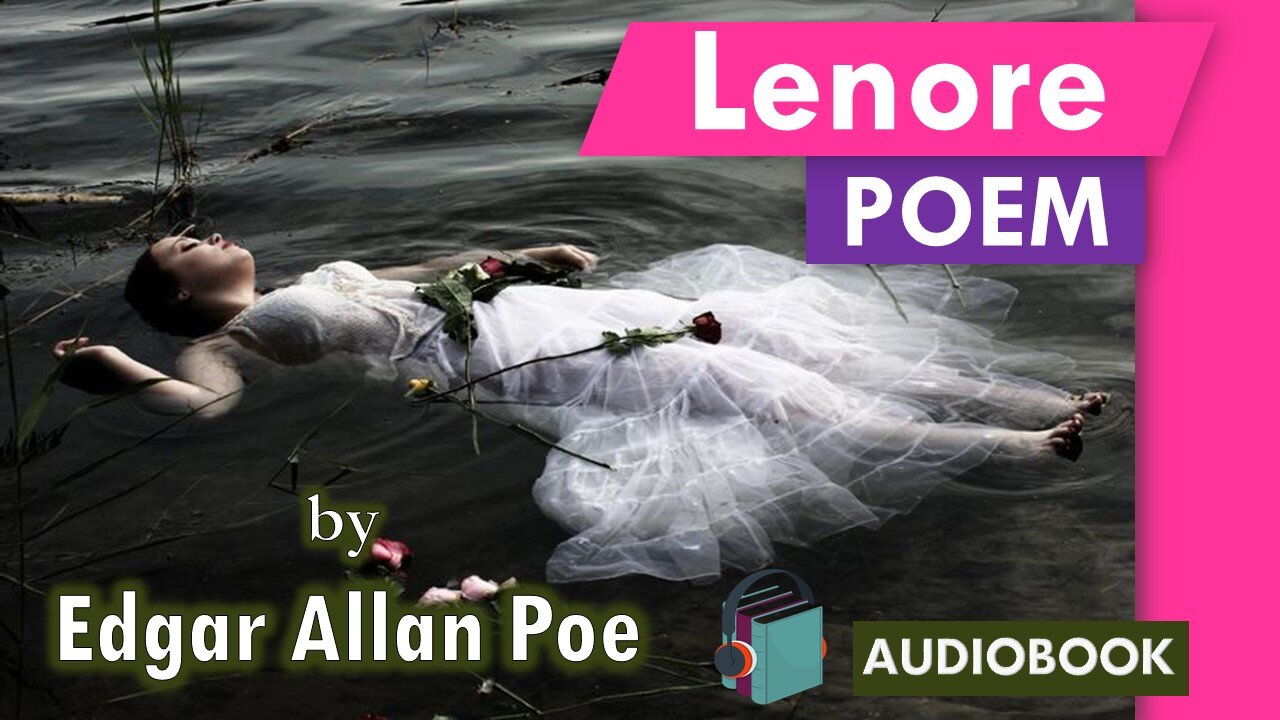Premium Only Content

Lenore: A Poem by Edgar Allan Poe
Listen to “Lenore”, a haunting poem in which Edgar Allan Poe speaks on themes of mourning and loss. He explores true sorrow and what it looks like. It was first published in 1831 under the title ‘A Paean.’ It was at that time an eleven quatrain poem that was told from the perspective of a bereaved husband mourning the death of his wife. It was not until the re-publication in February of 1843 that the name “Lenore” was included in the text.
The poem depicts the death of a beautiful young woman. It contains a dialogue between an opinionated mourner and the would-be-husband of the young, lost bride, Lenore.
Summary:
The poem begins with a mourner asking Guy De Vere, the intended husband of the dead Lenore, why he isn’t weeping. This person does not understand, asking if De Vere has seen Lenore’s dead body and really understood she is not coming back. De Vere reacts violently to the assertion that he doesn’t care. He calls the mourners “Wretches” who did not really care for Lenore.
The mourner tries to soothe De Vere by explaining they have all sinned but that doesn’t mean he should get so upset. It is time, the mourner states, for the songs to be sung and for Lenore’s “dead eyes” to be recognized. The poem concludes with De Vere stating that he will not mourn for his lost bride because she has escaped from the “damnéd” earth to sit alongside God.
Structure:
The poem has four stanzas, alternating between the poet/narrator and the voice of Guy de Vere. In the first stanza, the narrator mourns that the young woman has died so young and calls for an anthem or dirge to be sung on such a tragic occasion. He also questions why the bereaved fiancee is not crying as befits the death of his young love.
The second stanza is de Vere's answer. He accuses the assembled mourners of pretending to love the young girl simply for her wealth when they actually hated her. In fact, he suggests that their hatred may have brought on her early death.
The narrator returns in the third stanza to again focus on the proper way to mark the occasion. All should sing a Sabbath song and remember that the dead go before us into heaven and will be waiting there to welcome us.
Finally, in the last stanza, de Vere claims that he will not mourn but is so confident of being reunited in the afterlife that he sees only triumph in death.
The poem:
Ah broken is the golden bowl! the spirit flown forever!
Let the bell toll!--a saintly soul floats on the Stygian river;
And, Guy De Vere, hast thou no tear?--weep now or never more!
See! on yon drear and rigid bier low lies thy love, Lenore!
Come! let the burial rite be read--the funeral song be sung!--
An anthem for the queenliest dead that ever died so young--
A dirge for her the doubly dead in that she died so young.
"Wretches! ye loved her for her wealth and hated her for her pride,
"And when she fell in feeble health, ye blessed her--that she died!
"How shall the ritual, then, be read?--the requiem how be sung
"By you--by yours, the evil eye,--by yours, the slanderous tongue
"That did to death the innocent that died, and died so young?"
Peccavimus; but rave not thus! and let a Sabbath song
Go up to God so solemnly the dead may feel so wrong!
The sweet Lenore hath "gone before," with Hope, that flew beside
Leaving thee wild for the dear child that should have been thy bride--
For her, the fair and debonair, that now so lowly lies,
The life upon her yellow hair but not within her eyes--
The life still there, upon her hair--the death upon her eyes.
"Avaunt! avaunt! from fiends below, the indignant ghost is riven—
From Hell unto a high estate far up within the Heaven—
From grief and groan, to a golden throne, beside the King of Heaven!
Let no bell toll, then, lest her soul, amid its hallowed mirth,
Should catch the note as it doth float up from the damnèd Earth!
And I!—to-night my heart is light!—no dirge will I upraise,
But waft the angel on her flight with a Paean of old days!"
-
 1:16:30
1:16:30
RiftTV
4 hours agoHow Blue Light is Turning You Gay | The Rift | Guest: Jack Kruse
10.6K3 -
 LIVE
LIVE
Eternal_Spartan
11 hours ago🟢 Eternal Spartan Plays Final Fantasy 7 Remake Intergrade | USMC Vet | Join the Best Chat on Rumble
61 watching -
 LIVE
LIVE
MissesMaam
1 hour ago*Spicy Sips* Friend Friday with Mally_Mouse and Friends!!! 💚✨ (part 2 stweam crashed)
65 watching -
 LIVE
LIVE
Tundra Tactical
3 hours agoCrits & Giggles Diablo IV On A Friday Night!
39 watching -
 LIVE
LIVE
JdaDelete
20 hours ago $0.01 earnedMetal Gear Solid Δ: Snake Eater | Part 1 - Pretty Good?
15 watching -

Biscotti-B23
5 hours ago🔴 LIVE $5000 SINGLE ELIM TOURNAMENT 🏆 DEMON SLAYER HINOKAMI CHRONICLES 2
41 -
 LIVE
LIVE
SavageJayGatsby
20 hours agoFriend Friday | MicroWorks | $300 Weekly Goal for Spicy Bite Saturday | 250 Follower Goal!
37 watching -
 1:09:09
1:09:09
Edge of Wonder
4 hours agoCattle Mutilations, Chupacabra Sightings & NASA’s Voyager Goes Dark?
9.19K4 -
 LIVE
LIVE
Mally_Mouse
1 day agoFriend Friday!! 🎉 - Let's Play! - Microworks
76 watching -
 2:10:17
2:10:17
Quite Frankly
2 days agoHookah Special: Found Footage, Workplace Folly, More Cringe Music Vids (8/23/25 Re-Run)
14.8K6